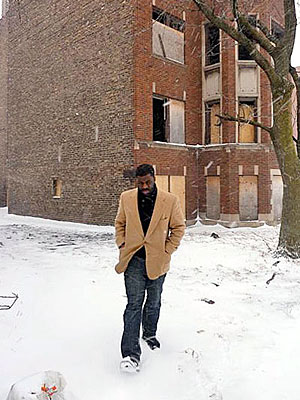
In the last few hours before the blizzard hit last Tuesday, Che “Rhymefest” Smith, the Grammy-winning rapper who is now running for alderman in Chicago’s 20th Ward, drove me around his neighborhood. The ward has over 30,000 vacant lots (most of them city-owned) and hundreds or perhaps thousands of foreclosed homes (there is no accurate count available), many of them boarded up.
Smith argues that those derelict sites represent an opportunity to transform the community. “We can make this the greenest neighborhood in the city,” he said as we viewed the bleak environs around 67th Street and South Langley Avenue through the windshield of the big white van he was driving.
Working with homeowners, landlords, and private entrepreneurs, Smith wants to take what he calls a “whole system” approach to greening the ward. Under his plan, impoverished residents would gain job skills by learning to retrofit existing homes with insulation, modern windows, and other green features. Green housing, both new and renovated, would cut occupants’ utility bills, attract new residents, and serve as a model for the whole city. And vegetable gardens in the ward’s now-vacant lots would help remedy the area’s “food deserts” while creating jobs and revenue. “We have an opportunity to reclaim all this land and housing,” Smith said. “The community can stand together to make itself healthy again.”
Smith, who won a Grammy in 2005 for co-writing Kanye West’s hit single “Jesus Walks,” is running against the ward’s incumbent alderman, Willie B. Cochran, and two other challengers in the February 22nd election. Since his election in 2007, Cochran, a former police officer, has brought several improvements to the ward. “Since being elected to my first term four years ago, I [have] helped develop 600 additional gardening plots totaling five acres,” Cochran said in a statement given me through a spokesman. “And we have created new partnerships with the City Colleges of Chicago to provide training on construction, tooling, and other needed skills.” Cochran also noted that he had supported programs to assist “families impacted by foreclosure and worked to rehab homes left in a state of disrepair.”
As would be expected, Smith criticizes his opponent’s efforts, saying they are not “part of an entire plan to help this neighborhood become something better.” But some of the key pieces of Smith’s own plan are vague—and perhaps even unrealistic. For instance, his suggestion that banks donate the deeds of foreclosed properties rather than abandon them could be a long, frustrating process. Still, his plan does offer a broad-strokes look at one way to turn the foreclosure crisis and other problems to the advantage of his ward and other city neighborhoods.
Earlier, as we sat in his campaign office—a back room in a car wash at 58th and State Streets—Smith had diagnosed the ward’s difficulties. “There is a disease here,” he said. “What I would like to do as alderman is start to make the medicine. It’s not going to be easy and fun, but if we work together, it’s totally possible to do something here that makes the 20th Ward [into a place] that the whole city looks to.”


